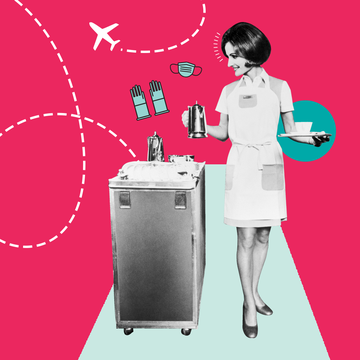1. Every time you show up to work, you're a part of someone's major life event. It's wonderful and exciting, but it's also tiring and comes with a lot of pressure. You can have a patient who just had a healthy baby and is crying happy tears in one room and then you can have a patient who just lost her newborn in another. Happy or sad, you're a part of a milestone for someone and you have to be able to adjust your emotions depending on your patients.
2. Regardless of your ability to help save lives, you're still human. And you know what? Humans make mistakes. More than they'd like to admit, too. For example, we communicate feeding plans with patients every night that include if the mother will feed the baby with a bottle, if we'll feed the baby with a bottle, or if the mother wants to breastfeed. Sometimes there are misunderstandings and we end up feeding the baby when the mother wanted to. Misunderstandings happen, and you learn from it.
3. The days are long, and you'll be on your feet for the majority of your 12-hour shift. Working for half the day isn't easy on you or your feet. Between medicating your patients' pain, helping mothers learn how to breastfeed, and feeding babies yourself, there's always a lot going on. The perk, though, is that your patients can't come home with you. At night when you clock out, it's not possible to work from home, so you have the chance to get the sleep you desperately needed.
4. Being a maternity nurse doesn't mean you're surrounded by happiness all the time. When you tell people what kind of nurse you are, they respond with "Oh, that's a happy job!" You also get, "So you play with babies all day? Lucky!" It's not all happiness, and the cries of a woman who just found out her child died and now she has to deliver him or her is a sound that's nearly impossible for you to forget. In those moments it's really difficult, but you have to stay strong and be a support system for your patient.
5. A mother's birthing plan doesn't always match up with the baby's plan. A lot of mothers want to be in control of their birth, and that's why they make a birthing plan. The truth, though, is that no one can plan for what might or might not happen. If a patient is in labor for 48 hours and her birthing plan says no drugs, as a nurse, I'm still going to suggest an epidural to help her get the rest she needs in order to push later on and avoid a C-section. A maternity nurse believes in this nursing plan: have a healthy baby and a healthy mom.
6. You have to explain to your friends and family that you'll frequently go missing in action, courtesy of double shifts. If you're not working, then you're sleeping, and no one should attempt to call or text you out of the fear that they might wake you up.
7. You'll form a stronger connection with your patients than you ever thought you would. Your patients share one of the most exciting moments of their lives with you, and that creates a unique bond. You'll have mothers who want to continue to share moments with you – and when they send photos of their 5-year-olds who you took care of when they were just a minute old, you will feel incredible.
8. Everyone will underestimate your job because you're only working three shifts a week, after all. LOL! Three shifts a week for 12 hours on your feet dealing with feeling happy one moment because you just helped a mother learn how to breastfeed and then having to get serious two minutes later because your next patient needs an emergency C-section and you have to help prep her for surgery. You're not working "just" three days a week, you're working on your feet for at least 36 hours a week — plus all the times you work overtime to cover for someone on your floor.
9. You need to be open to forming close relationships with your coworkers. The relationships you will form with your fellow nurses aren't the same as coworkers who share a cubicle. These are the people you'll save lives with. They're the people who will keep you going during long shifts, and you learn to count on each other. If you don't want to work closely with people and build relationships, maternity nursing isn't for you because it's not a one-person show.
10. The job is extremely messy. Postpartum bleeding, formula, baby spit, and all types of bodily fluids will get on your scrubs, your shoes, and pretty much everywhere sometimes. Leaving work and going to meet with someone right after for a bite to eat doesn't work in this field. The first thing you're going to want to do when you leave the hospital is throw your scrubs in the wash and take a long shower.
11. You can't learn everything about being a maternity nurse in nursing school. Being a nurse requires knowing how to handle stress in a situation where a patient is anything but calm. It requires you to care about your patients on an emotional level because they're not just a client, they are real people who are going through real, intense things. Knowing the textbook terms is required to be a good nurse, but knowing the terms and how to care for others will make you a great nurse.
The nurse interviewed for this post is an R.N. in Connecticut.
Follow Danielle on Twitter.

I like pink, iced coffee, and long walks through the candle section. When I'm not lighting up my favorite scents (probably while testing out new skincare), you can find me writing and editing all of the lifestyle things at Seventeen.












